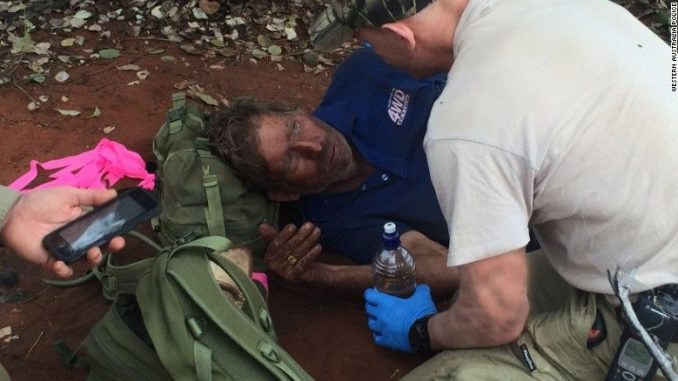
An Aussie hunter who managed to get lost in the Great Victoria Desert in Western Australia was found lying under the shade of a tree surviving on a diet of black ants.
Australian police have reported the man to be showing signs of a positive recovery after his 6 day ordeal without food and water in the vast red desert.

BYPASS THE CENSORS
Sign up to get unfiltered news delivered straight to your inbox.
You can unsubscribe any time. By subscribing you agree to our Terms of Use
Latest Video
CNN reports:
Reginald Foggerdy, 62, had embarked on a hunting trip last week with his brother in the Great Victoria Desert in Western Australia.
He went missing Wednesday after setting off to hunt animals in the dry, sandy wilderness, wearing only a t-shirt, shorts and flip-flops, according to police.
After a “massive” land and air search, police officers aided by Aboriginal trackers found Foggerdy “extremely dehydrated, a bit delusional” on Tuesday, said Police Superintendent Andy Greatwood.
“His last couple of days of survival were achieved by lying down under a tree and eating black ants,” Greatwood told local radio. “That’s the level of survival that Mr. Foggerdy has gone to.”
This shooters shack was used as a command post for the search for Mr Foggerdy #polair #swaggingit pic.twitter.com/NwlFi24WIO
— WA Police (@WA_Police) October 13, 2015
Photos release by Western Australia Police showed a dusty, unshaven Foggerdy talking to his rescuers under the tree before he was put in a helicopter.
Greatwood said the hunter was found about 15 kilometers (9 miles) from where he went missing, an area roughly 170 kilometers east of Laverton, the nearest town. “He’s received treatment — first aid — on the ground and it’s fair to say he’s now sitting up and talking — so looking very positive,” he said.
Ants and other insects are highlighted as possible sources of nutrients by survival experts, but it’s still extraordinary that Foggerdy managed to stay alive for so long in a region where temperatures frequently soar above 90 degrees Fahrenheit (32 degrees Celsius).
Every contact leaves a trace.. this is one of Mr Foggerdy’s actual footprints that TRG Trackers used to find him. pic.twitter.com/Lq9k9Niv3a — WA Police (@WA_Police) October 13, 2015
He had “no water whatsoever for six days,” Greatwood said.
Foggerdy’s wife, Arlyn, said she cried upon hearing the news that he’d been found alive.
“How you can survive without water and food is a miracle,” she said, according to the Australia Broadcasting Corporation.
The Great Australia Desert is the largest desert in Australia. It has “red sand dunes, stony plains and dry salt lakes” but no permanent surface water, according to Australian authorities.


